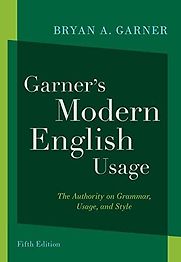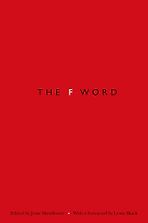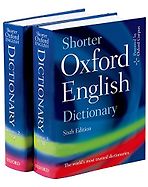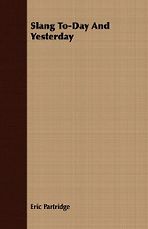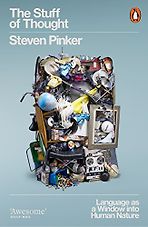Garner's Modern English Usage (5th edition)
by Bryan A. Garner
Bryan Garner, the American equivalent of the Académie française, has updated his Garner’s Modern English Usage. It’s the 5th edition (the first was published in 1998), and it opens with an exchange at a car rental counter over the use of ‘may’ versus ‘can.’ He writes, “Experiences like that one give me hope: they show that some people still care about our language, however misplaced their concerns might occasionally be.”
If you don’t follow debates about language and grammar closely, the bottom line is this: language changes all the time, which makes it hard to say what’s right or wrong. However, we do need some guidance. Garner’s Modern English Usage is an attempt to grapple with this contradiction in a very practical way. And it is important: your ability to use language correctly shows in every text, every email, every job application or interview. So yes, you can use ‘disinterested’ to indicate a lack of interest, but its misuse will be noticed by some listeners, so why not avoid it? Garner goes through every usage you’ve ever wondered about (internet or Internet?) and many you didn’t (dilemma—a choice between two unpleasant or difficult alternatives—should not be used by slipshod extension for plight or predicament), word by word.
Recommendations from our site
“Bryan Garner is considered a traditional prescriptivist in the so-called Usage Wars. But he is the best of the bunch. While he is unafraid of condemning a usage as ‘wrong’, every entry in his book has a 5-point scale, which allows him to be more subtle than that: ‘mostly wrong’ or ‘nearly acceptable’. Second, he uses a deep well of citations to buttress his claims. Third, the latest edition makes use of the vast data from Google Books, so he can find out whether a usage is growing or receding, common or rare. That has even, in a small few instances, changed his rulings from previous editions. (Never trust a person who won’t change their mind no matter what the evidence.) As a relatively conservative volume, this is the book you turn to for advice that will help you avoid annoying the most hardened sticklers. But Garner has no truck with fake rules like the prohibition of split infinitives.” Read more...
Grammar Books That Prove What They Preach
Lane Greene, Journalist
“This book is the closest thing Americans have to a national authority…Garner’s Modern American Usage just has this weight of authority to it. It is very carefully organised and prepared. It is very well written. The author is very well respected as a kind of arbiter of effective written communication. I just find it a great resource for making decisions about which word is most effective in conveying what I want to communicate to my audience…There’s a habit, in American English at least, of using the word ‘bicep’ as if biceps is a plural and bicep is the singular. But ‘biceps’ is actually a singular noun, it just happens to have an ‘s’ at the end because it is based on the Latin, and Latin does that sometimes. So Garner will tell you that if you want to be considered a careful writer, if you want people to respect you as an authority when you are writing, then you are not going to talk about your left ‘bicep,’ you are going to talk about your left ‘biceps.’ It gets into that laser-like level of detail about the right thing to do if you want people to feel that they can trust you.” Read more...
The Best Grammar and Punctuation Books
Mark Nichol, Linguist
Our most recommended books
-

The F-Word
by Jesse Sheidlower -

Shorter Oxford English Dictionary
by Oxford University Press -

Slang To-day and Yesterday
by Eric Partridge -

The Stuff of Thought: Language as a Window into Human Nature
by Steven Pinker -

History in English Words
by Owen Barfield -

The Professor and the Madman: A Tale of Murder, Insanity, and the Making of the Oxford English Dictionary
by Simon Winchester
